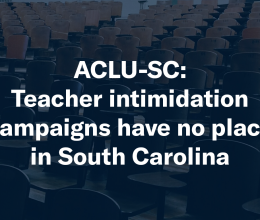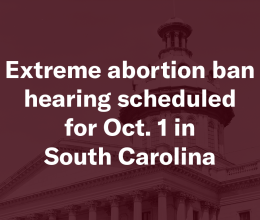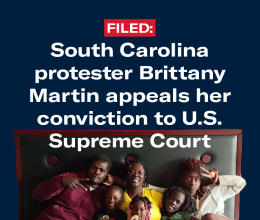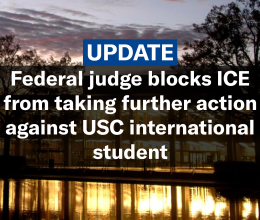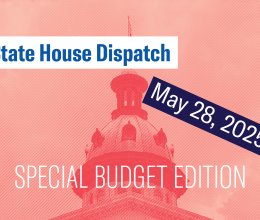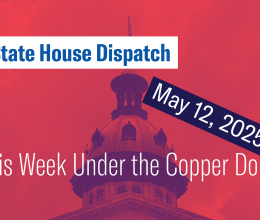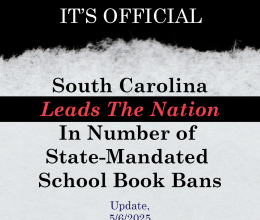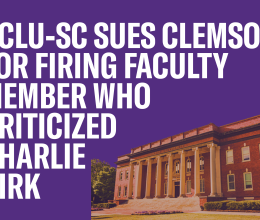
COLUMBIA – South Carolina public school librarians and students filed a lawsuit today asking a federal court to block enforcement of the state’s unconstitutional book banning regulation and a classroom censorship memo issued by the state education superintendent.
The lawsuit challenges the constitutionality of Regulation 43-170, which bans all materials in kindergarten through 12th grade public schools if they contain descriptions or depictions of “sexual conduct.” This regulation, which was promoted by Superintendent Ellen Weaver and took effect in June 2024, has led to the banning or restriction of 22 books statewide — the largest number of state-mandated school book bans in any state, according to PEN America. (See the full list of books below.)
The lawsuit also challenges a memorandum issued by Superintendent Weaver on March 14, 2025, that requires state employees to indoctrinate students according to the superintendent’s views on sex, gender, race, and American exceptionalism. The memo prohibits 14 ideas and concepts from S.C. Department of Education materials, including “implicit bias,” “restorative justice,” “cisgender,” and “social-emotional learning,” although it notes that its list of taboo concepts is “not exhaustive.”
The American Civil Liberties Union of South Carolina filed today’s lawsuit in the U.S. District Court for the District of South Carolina on behalf of the South Carolina Association of School Librarians and three minor public school students. The suit challenges the superintendent’s censorship regime under the First and Fourteenth Amendments to the U.S. Constitution.
"Censorship in schools limits students' ability to think critically and engage with diverse perspectives. K-12 students deserve intellectual freedom that empowers them to explore ideas, question assumptions, and develop critical thinking skills," said Tenley Middleton, President of the South Carolina Association of School Librarians. "Leadership from the South Carolina Association of School Librarians has persistently sought to engage with the Department of Education and the State Board regarding Regulation 43-170 — to no avail. We stand with the ACLU of South Carolina in denouncing censorship and championing intellectual freedom."
"The confusion and fear stemming from Regulation 43-170 and Ellen Weaver's memorandum have been overwhelming," said Dylan Rhyne, a high school senior in the Charleston County School District and plaintiff in the lawsuit. "I hope that by taking action now, we can restore the safe and welcoming school environment I once knew and make things even better for those to come."
"Regulation 43-170 is so vague that even the State Board can't apply it consistently — retaining 1984 while banning other books with similar content. The result is a climate of fear where librarians preemptively remove hundreds of books and teachers abandon classroom libraries to avoid risking their careers,” said Sam Kennedy, Staff Attorney for the ACLU of South Carolina. “South Carolina students are losing access to award-winning literature, Advanced Placement exam materials, and critical research tools because of a regulation that ignores constitutional protections and makes no distinction between age groups, disregards educational value, and ignores the difference between acclaimed literature and obscenity."
Regulation 43-170 is vaguely worded and does not take into account whether a material appeals to the prurient interest, is patently offensive, or otherwise has educational, literary, artistic, political, or scientific value. This regulation, pushed by the superintendent with the help of outside legal counsel that she hired on the taxpayers’ dime, runs afoul of the First Amendment standards set in cases like Miller v. California (1974), Island Trees School District v. Pico (1982), and Ginsberg v. New York (1968).
In addition to the 22 books removed or restricted statewide, local interpretations of Regulation 43-170 have sown chaos and confusion among school employees. The regulation has also been cited as the justification for the following restrictions on students’ freedom to receive information:
- Some teachers across the state have stopped keeping classroom libraries after a clause in Regulation 43-170 required them to catalog all books held in their classrooms.
- Under what the lawsuit describes as “a culture of fear among school librarians,” some school librarians have stopped purchasing fiction books for their collections and have begun preemptively removing books that they worry might be challenged.
- The Berkeley County School District blocked student access to Discus, a free online education and research collection provided by the State Library. After public outcry, the district restored access for high school students only at the start of the 2025-2026 school year.
- The Beaufort County School District has restricted access to nine additional books that now require parental permission for a student to access them, including The Bluest Eye by Toni Morrison, The Kite Runner by Khaled Hosseini, and The Freedom Writers Diary by Erin Gruwell. Some of these books are routinely assigned in Advanced Placement courses.
- Districts including the Fort Mill School District have removed or restricted student access to county libraries’ digital collections via the Sora application rather than risk the possibility that students might access materials that describe “sexual conduct.”
To quote the landmark 1943 Supreme Court case West Virginia Board of Education v. Barnette, this case is about a government official — in this case the head of the public school system — seeking to “prescribe what shall be orthodox in politics, nationalism, [or] religion” and to “strangle the free mind at its source.”
Hundreds of South Carolinians warned Superintendent Weaver that her actions violated the First Amendment rights of students and educators. Some, like plaintiff Dylan Rhyne, spoke to her directly in State Board of Education meetings. The superintendent brushed those concerns aside and demanded ideological conformity, and now the students and educators are asking the court to intervene in defense of freedom.
The following books have been removed from South Carolina public school classrooms and libraries under Regulation 43-170, regardless of grade level:
- All Boys Aren't Blue by George M. Johnson
- Collateral by Ellen Hopkins
- A Court of Frost and Starlight by Sarah J. Maas
- A Court of Mist and Fury by Sarah J. Maas
- A Court of Thorns and Roses by Sarah J. Maas
- A Court of Wings and Ruin by Sarah J. Maas
- Damsel by Elana Arnold
- Empire of Storms by Sarah J. Maas
- Flamer by Mike Curato
- Half of a Yellow Sun by Chimamanda Ngozi Adichie
- Hopeless by Colleen Hoover
- Identical by Ellen Hopkins
- Kingdom of Ash by Sarah J. Maas
- Last Night at the Telegraph Club by Malinda Lo
- Living Dead Girl by Elizabeth Scott
- Lucky by Alice Sebold
- Normal People by Sally Rooney
- Push by Sapphire
- The Perks of Being a Wallflower by Stephen Chbosky
- Tricks by Ellen Hopkins
- Ugly Love by Colleen Hoover
Additionally, the State Board of Education has restricted access to Ellen Hopkins' novel Crank. The book remains in high school libraries, but a parent or guardian must fill out an opt-in form for a student to borrow it.

